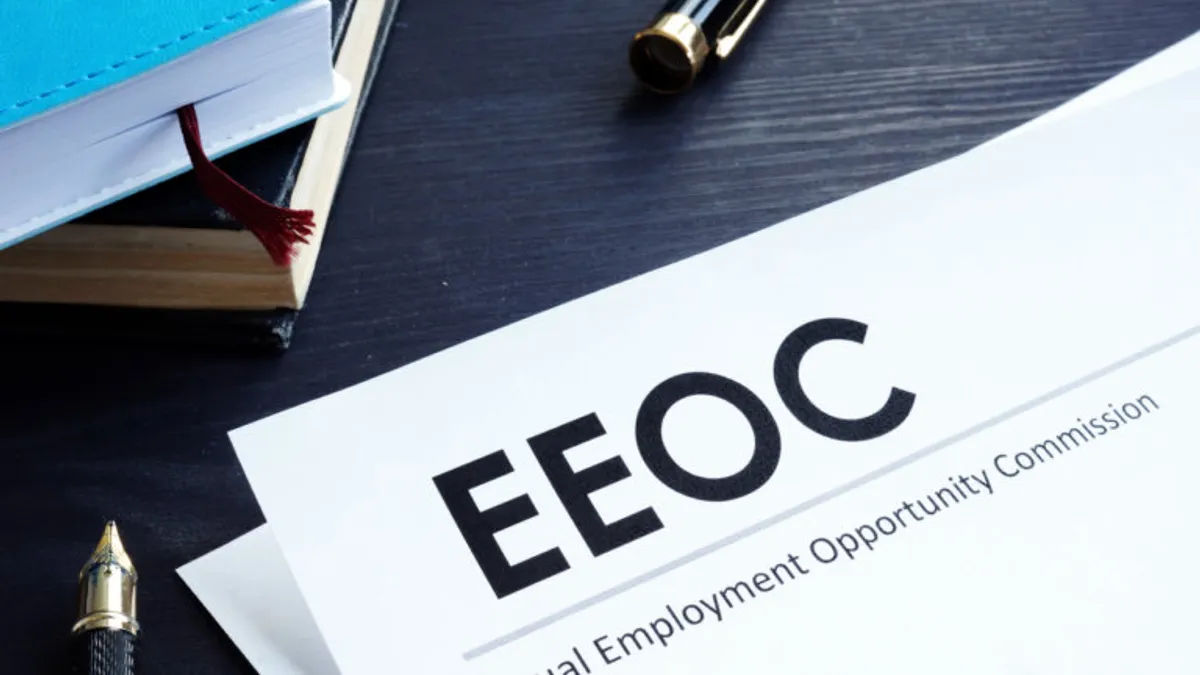Dive Brief:
- The time from when a person files an inquiry with the U.S. Equal Employment Opportunity Commission to when EEOC officials interview the person about alleged incidents — the “intake process” — varies significantly among the agency’s 53 field offices, new findings by the U.S. Government Accountability Office show. If the process takes too long, some people may not take the next steps to file a discrimination charge, the GAO said.
- In FY 2021, the fastest field office took an average of 11 days to process an inquiry; the slowest office took 111 days, according to the Oct. 31 report. The agency-wide average was 69 days. However, the EEOC doesn’t monitor why these times vary so drastically, the report found. By not doing so, the EEOC is missing information that could allow it to better identify and provide support to offices that take longer to complete the intake process, the report concluded.
- “We would like to see EEOC closely monitor the length of the intake process, just like it monitors other aspects of its operations,” Dawn Locke, GAO’s acting director of education, workforce and income security, explained in an email to HR Dive. For example, the EEOC tracks overall charge processing times and investigator caseloads. “Data on the length of the intake process could be incorporated into these reports,” Locke said.
Dive Insight:
The report documents findings of an investigation the GAO undertook at the request of Republican Rep. Virginia Foxx of North Carolina, GOP leader of the House Committee on Education and Labor.
The issue about the length of the intake process “came to the forefront during our discussion groups with EEOC charge investigators,” Locke told HR Dive. Multiple investigators had concerns about it and how it could be inhibiting new charge filings, she said.
The process is important because that’s “how an individual gets their foot in the door and potentially pursues actions against their employer,” Locke explained. Most laws enforced by the EEOC require individuals to file a charge with the agency before they can sue their employer, and individuals typically must go through an intake interview before they can file a charge, Locke added. One field officer told the GAO that their biggest pain point is when individuals who intend to file a charge don’t because they’re unable to easily secure an appointment for an interview.
For employers, the intake process is important for a few reasons, Michael Eastman, senior vice president of policy and assistant general counsel for the Center for Workplace Compliance, told HR Dive in an email.
First, the process can prevent nonmeritorious charges from being filed, Eastman said. Such charges can consume too much of the EEOC’s time and resources, as well as an employer’s time and resources if it has to respond to a nonmeritorious change.
As things stand now (in FY 2021), the EEOC finds reasonable cause to believe discrimination occurred in 2.7% of cases and no reasonable cause in 63.6% of cases, Eastman noted. “The intake process can remove some of the easy cases — maybe the alleged conduct isn’t covered by a law enforced by the EEOC, maybe it occurred before the filing period, and maybe the employer is not covered (fewer than 15 employees),” he explained.
Second, the intake process can help make sure an EEOC charge identifies the right issue. It’s the charge the employer will need to respond to, Eastman added. “A properly drafted charge can help ensure that an employer’s position statement will be on point,” he said. And that can lead to quicker resolutions, or at least a narrowing of the issues, Eastman pointed out.
In FY 2021, the EEOC received more than 145,000 inquiries and 60,000 discrimination charges, according to the GAO report.













